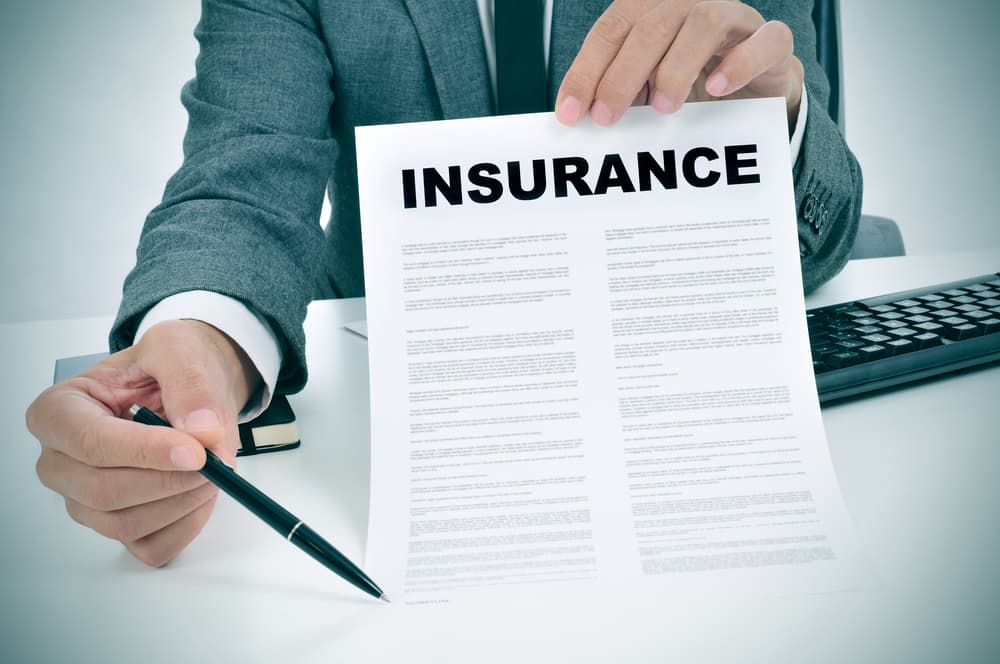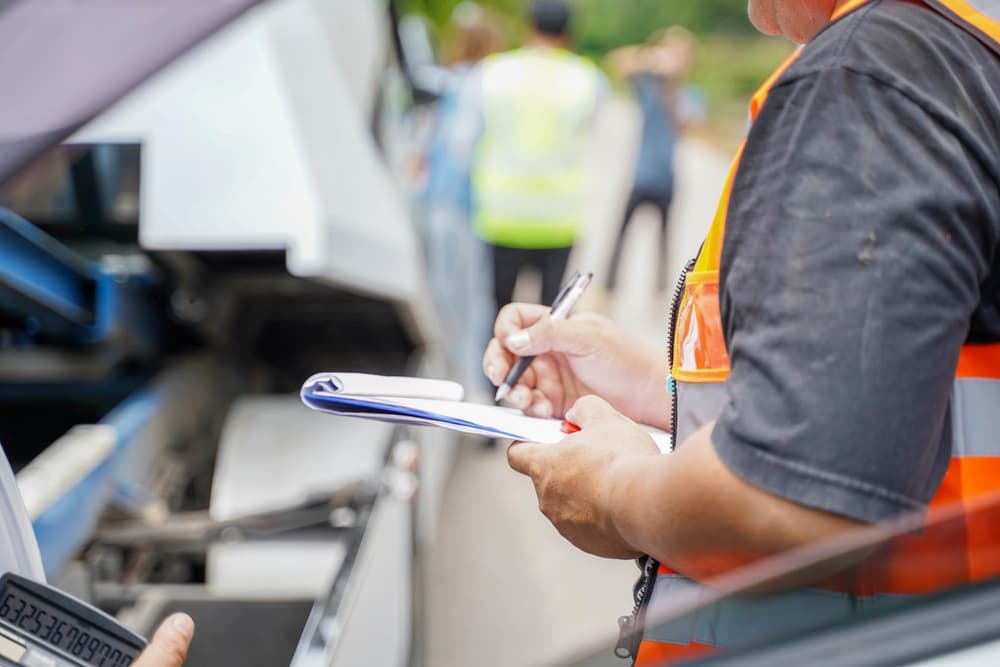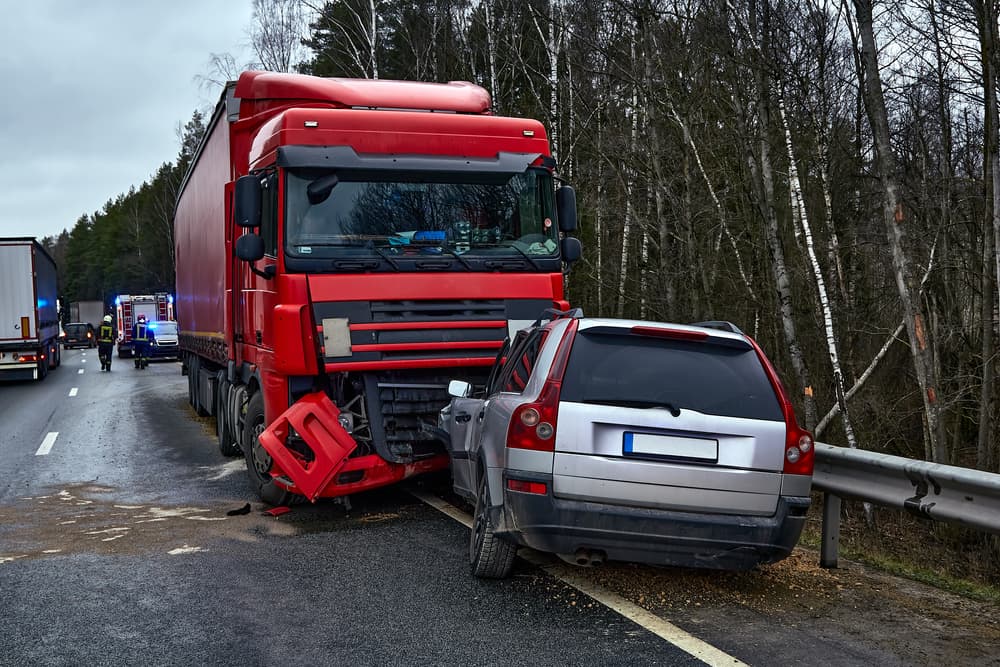Experiencing a truck accident can change your life, given the massive size and weight of these vehicles, leading to more severe consequences than typical vehicular accidents.
If you or someone close has been affected by such an incident, you'll need to understand the ins and outs of the claim process. This includes expectations and how a truck accident attorney can support you.
Schedule A Consultation Today!
Understanding Your Insurance Policy

One of the initial steps post-truck accident is to get a clear picture of your insurance coverage. This step is key as truck accidents often have more severe damages, and the insurance landscape can be more intricate.
Begin with reviewing your policy to identify your coverage types and limits. Usual coverages include liability, collision, comprehensive, and uninsured/underinsured motorist coverage. Liability coverage comes into play when you are at fault for the accident. Collision coverage aids in repairing or replacing your vehicle post-accident, regardless of fault. Comprehensive coverage shields against non-collision damages, while uninsured/underinsured motorist coverage is crucial when the other party lacks sufficient insurance.
Acknowledging the limits of your policy is equally important. With the high costs associated with truck accidents, knowing your coverage bounds helps assess if additional compensation from the other party's insurance or a personal injury lawsuit is necessary.
Considering the truck's insurance is also important, especially for commercially used trucks, which often have policies with higher limits due to the potential for significant damages. Claims against commercial insurers can be complicated, given their proficiency in minimizing payouts.
Furthermore, truck accidents can involve multiple liable parties beyond the driver, such as the trucking company, the vehicle's owner, or the parts manufacturer, each possibly having separate insurance, adding layers to the claim process.
A truck accident lawyer can inform you about the statute of limitations for filing claims (these periods vary by state). Missing these deadlines can mean forfeiting the right to compensation, underlining the importance of timely action and possibly legal guidance to ensure adherence to all deadlines.
Hiring a Truck Accident Lawyer
Seeking legal assistance from a truck accident lawyer early on can influence your claim's direction and outcome. Truck accident lawyers do more than offer legal advice; they advocate, negotiate, and guide you through the legal system.
A truck accident lawyer enlightens you on your legal rights and options, shedding light on many unknowns. This knowledge allows you to make informed decisions about your claim. They guide you through the legal processes, from filing claims to handling paperwork and adhering to deadlines, making the journey less overwhelming.
Identifying all potentially liable parties is more complex in truck accidents. A truck accident lawyer actively ensures they do not overlook any possible sources of compensation.
Finding a truck accident lawyer can be as easy as searching online or seeking recommendations from trusted contacts. Scheduling consultations with multiple truck accident lawyers can aid in selecting the one that best suits your needs.
Investigative Steps in a Truck Accident Claim

The investigation after your truck accident forms the bedrock of your claim, laying out the facts of the accident, pinpointing liability, and assessing the full extent of damages incurred.
Collection and Analysis of Scene Evidence
The investigation commences with the gathering of evidence at the accident scene. This evidence can help recreate the events leading up to the accident, including photographs or videos of the scene, the vehicles involved, and any visible injuries. These visuals capture the aftermath of the accident, providing insights into the collision's severity, the positioning of vehicles, road conditions, and any obstructions or signage that may have played a role.
Review of Official Reports
Your lawyer will scrutinize all available official reports related to the accident. The police report is particularly valuable as it contains the responding officer's observations, the results of any sobriety tests conducted, and an initial assessment of who was at fault. This report might also list witness statements and traffic citations issued at the scene. Besides police reports, your lawyer will review any accident reports filed by the trucking company or other entities involved.
Witness Interviews
Eyewitness accounts are pivotal for corroborating the sequence of events and can sometimes offer details not captured in official reports. Your lawyer will identify and interview these witnesses, including other motorists, pedestrians, or residents near the accident site. These interviews aim to gather diverse perspectives that paint a more complete picture of the accident.
Consultation with Accident Reconstruction Specialists
In complex cases where the dynamics of the accident are unclear or disputed, your lawyer may use accident reconstructionists. These specialists utilize the collected evidence, such as skid marks, vehicle damages, and any available truck electronic data (e.g., GPS data, dash cams), to piece together how the accident occurred.
Their analysis can reveal details about the speed of the vehicles, the point of impact, and the actions of the drivers moments before the collision, providing a scientific basis for establishing fault.
Examination of Trucking Company and Driver Records
A thorough investigation also involves looking into the truck driver's background and the trucking company's operations. This includes examining the driver's licensing, training, and driving record, as well as the trucking company's history of vehicle maintenance, driver employment practices, and adherence to federal safety regulations.
Any violations or patterns of negligence uncovered can significantly strengthen your case by demonstrating a history of reckless behavior or systemic safety failures.
Review of Medical Records and Financial Damages
Understanding the accident's full impact on your life means reviewing all medical records related to injuries sustained and calculating current and future financial costs. This review helps quantify the damages for medical expenses, lost income, and potential long-term care needs. Your lawyer will collaborate with medical professionals to comprehend the extent of your injuries and with financial professionals to project future losses or expenses, actively ensuring the development of a comprehensive claim.
Legal and Regulatory Compliance Review
Finally, your lawyer will ensure that all investigative steps comply with relevant laws and regulations. This includes adhering to the statute of limitations for filing a claim, correctly submitting all required documentation, and ensuring that evidence collection does not infringe on privacy rights or legal procedures.
Navigating Interactions with Insurance Companies After a Truck Accident

Interacting with insurance companies following a truck accident involves a nuanced and strategic approach, especially in light of initial settlement offers that often fall short of covering the full extent of damages and losses. Your lawyer acts as your advocate, ensuring that the compensation proposed by insurers aligns with the true impact of the accident on your life.
Initial Contact and Statement Gathering
After a truck accident, insurance companies waste no time contacting those involved to gather statements and information about the incident. It's crucial at this stage to have legal representation, as insurers are professionals at framing questions in ways that might undermine your claim.
Your truck accident lawyer can guide you on communicating with insurers, actively ensuring the protection of your rights and preventing inadvertent disclosure of information that may harm your claim.
Assessment of Settlement Offers
Insurance companies frequently present initial settlement offers quickly after an accident, hoping that victims will accept them before fully realizing the extent of their damages and losses. These initial offers rarely reflect the true costs of medical treatments, lost income, and other damages. Your lawyer assesses these offers, comparing them against a detailed calculation of your current and future needs resulting from the accident.
Effective Negotiation Tactics
Armed with a comprehensive understanding of your case, your lawyer negotiates with the insurance company. Effective negotiation tactics include:
- Presenting Comprehensive Evidence: This includes medical records, professional testimonies, and evidence of emotional distress, which collectively substantiate the demand for a higher settlement.
- Highlighting Policy Coverage: Lawyers review the insurance policy terms to ensure that all potential sources of compensation are explored and leveraged in negotiations.
- Counteracting Lowball Offers: By preparing a counter-response that details the rationale behind a higher demand, lawyers can pressure insurers to reconsider their initial offers.
Mediation and Arbitration
Mediation or arbitration may be pursued as alternative dispute resolution methods if negotiations reach a stalemate. These processes involve a neutral third party who assists in settling. Your lawyer represents your interests, presenting evidence and arguments to advocate for a fair resolution.
Litigation Preparedness
A crucial negotiation tactic involves actively preparing for trial if a satisfactory settlement proves unattainable. The possibility of litigation can motivate insurers to offer a fair settlement to avoid the costs and uncertainties of a court case. Your lawyer prepares your case for trial from the outset, gathering evidence and formulating legal strategies that highlight the strength of your claim.
Communication and Advocacy
Throughout the process, your lawyer maintains open lines of communication with you, providing updates and explaining the implications of each decision. This advocacy ensures that you voice your needs and goals actively, driving the negotiation process.
Finalizing the Settlement
Once a settlement emerges, your lawyer reviews the terms to ensure they align with your best interests before finalization. This involves ensuring that the agreement comprehensively covers all aspects of your damages and that you promptly receive the compensation.
Assessing Damages in Truck Accident Claims

In the wake of a truck accident, accurately assessing the damages becomes critical in ensuring that the compensation received reflects the full extent of the losses suffered. This process encompasses tangible and intangible losses, from immediate medical bills to the long-term impact on quality of life.
Medical Expenses
Medical expenses constitute a significant portion of the damages in a truck accident claim. This category includes emergency treatment costs, hospitalization, surgery, medication, and ongoing care expenses.
Lost Income and Earning Capacity
The impact of a truck accident on an individual's ability to work is another factor in assessing damages. Lost income covers the income lost during the recovery period.
However, if the injuries result in a reduced capacity to earn in the future or necessitate a career change, the calculation of lost earning capacity becomes more complex. Lawyers often work with economic professionals to project these future losses, considering the victim's age, career trajectory, and the severity of the injuries.
Property Damage
Property damage assessment involves determining the cost of repairing or replacing any personal property damaged in the accident, most notably the victim's vehicle. The assessment will consider the property's market value before the accident and the cost of repairs.
Pain and Suffering
Non-economic damages, such as pain and suffering, account for the physical and emotional distress caused by the accident.
Emotional Distress
Similar to pain and suffering, emotional distress covers the psychological impact of the accident, including anxiety, depression, and post-traumatic stress disorder (PTSD). The assessment of emotional distress may require testimonies from mental health professionals and an in-depth understanding of how the accident has altered the victim's psychological well-being.
Loss of Enjoyment of Life
Accidents causing severe injuries can hinder an individual's ability to enjoy hobbies, activities, and daily routines they once found pleasurable. Calculating compensation for the loss of enjoyment of life involves assessing how much the victim's quality of life has diminished due to their injuries.
Punitive Damages
In cases where the defendant's actions were particularly reckless or egregious, the pursuit of punitive damages becomes a possibility. These are intended not as compensation for the victim but as punishment for the defendant and a deterrent against future misconduct.
Consultation with Professionals
To ensure a comprehensive and accurate valuation of damages, lawyers often collaborate with a range of professionals, including medical professionals, economists, vocational rehabilitation professionals, and life care planners. These professionals provide insights and testimonies that strengthen the case for compensation across all categories of damages.
Claim Submission Process
Filing a claim after a truck accident is a key step in getting compensated for your losses. This part of the process requires gathering important paperwork to show how the accident affected you. Your lawyer is there to help sort everything out.
They'll assemble all the needed documents, like medical bills, proof of missed work and lost income, and any photos or reports showing damage to your property.
They also actively ensure the timely and accurate submission of all documents to the insurance company or the court. Their know-how helps avoid hitches or hold-ups due to small mistakes, ensuring your claim is strong and ready to go.
Settlement Negotiations
Once the claim is submitted, the next phase involves settlement negotiations. Both parties often prefer this stage to avoid the uncertainties and expenses of a court trial.
Your lawyer leverages the evidence collected during the investigation to advocate for a settlement that adequately compensates for your losses. This involves a series of discussions and exchanges with the insurance company's representatives or the defendant's lawyers.
Your legal representative will keep you informed and involved in decision-making, providing guidance on whether to accept, reject, or counteroffer settlement proposals. The goal is to reach an agreement reflecting the true value of your claim without needing a trial.
Court Proceedings (If Necessary)
Should settlement negotiations reach an impasse, the next recourse is to take the case to court. This step involves filing a lawsuit against the party or parties responsible for the accident. Your lawyer manages every aspect of the litigation process, from drafting and filing the legal documents to representing you in court.
This includes pre-trial discovery, where both sides exchange evidence, through to the trial itself, where your lawyer will present your case, cross-examine witnesses, and argue on your behalf.
The decision to proceed to trial involves your input, and your lawyer will prepare you for what to expect, actively advocating for you at every step to secure a favorable judgment.

Contact a Truck Accident Lawyer
Hiring a truck lawyer after a truck accident can maximize your compensation potential, easing your path toward recovery. If you've been in a truck accident, contact a personal Injury lawyer for a free case consultation.
